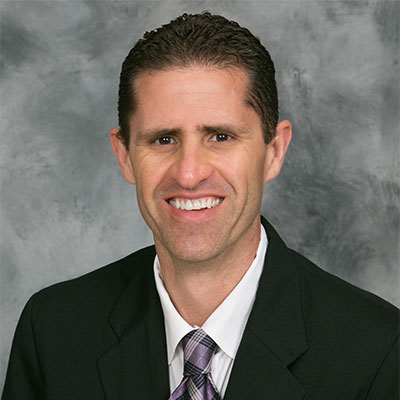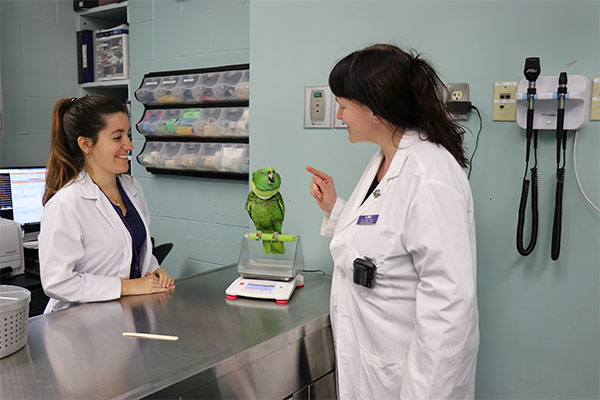ZOOLOGICAL MEDICINE
Our Expertise
The team of health care professionals that make up the LSU SVM Zoological Medicine Service has a focus of total health care for your bird, reptile, or small exotic companion animal. We not only provide quality health care for the patient but also place significant emphasis on client education as it relates to the husbandry and dietary needs of the diverse species treated. Client education brochures and food samples are commonly provided to clients as a way of reinforcing the information discussed during the visit. An office visit includes a complete physical examination along with a comprehensive examination of the patient’s environment, diet, and husbandry requirements that will affect the animal’s quality of life and long term health.
Services
Certain animals cannot be examined, admitted or treated by the LSU VTH due to liability and safety issues. These include privately owned wild carnivores (including, but not limited to, lions, tigers, cougars, bobcats, bears, wolves, wolf hybrids, skunks, raccoons, river otters, coyotes, and foxes), primates, bats, and venomous reptiles. Wildlife rehabilitators or falconers presenting cases to the LSU VTH must have the appropriate permits.
Birds
General Medicine
- Wellness examination/health examination (recommended once to twice per year)
- Pediatric examinations
- Feather picking/plucking
- Egg binding
- Leg band removalaceration repair
- DNA sexing via blood sample
- Bandaging and wound management
- Polyoma vaccination
- Husbandry consultations
- Microchip implantation (AVID)
Surgery
- Surgical sexing via endoscopy
- Salpingectomy (spay)
- Orthopedic procedures
- Egg binding
- Endoscopy
- Amputations
- Biopsy
- Ingluviotomy
- Enucleation
- Reconstructive surgery
Advanced Imaging
- Digital radiography (x-rays)
- Fluoroscopy
- CT scan
- MRI
- Ultrasound
Specialized Equipment and Services
- Radiosurgery unit
- Microsurgery techniques
- Rigid and flexible endoscopy
- Nebulization
- Temperature-controlled housing
- Oxygen cage
- Multi-parameter anesthesia monitoring
Diagnostic Testing
- Complete blood count (CBC)
- Chemistry panel
- Parasitology
- Bacterial culture and sensitivity
- Fungal culture
- Avian chlamydiosis Chlamydophila psittaci)
- Psittacine Beak and Feather disease
- Avian aspergillosis
- West Nile virus
- Cytology
- Fluid analysis
- Histopathology
- Necropsy
Reptiles
Please note that hospital policy prohibits treatment of venomous reptile species.
General Medicine
- Wellness examination/health examination (recommended once to twice per year)
- Pediatric examinations
- Probe sexing
- Egg binding
- Laceration repair
- Bandaging and wound management
- Husbandry consultations
Surgery
- Surgical sexing via endoscopy
- Salpingectomy (spay)
- Orthopedic procedures
- Egg binding
- Endoscopy
- Amputations
- Biopsy
- Cystotomy
- Shell repairs
- Exploratory surgery
- Enucleation
- Reconstructive surgery
Advanced Imaging
- Digital radiography (x-rays)
- Fluoroscopy
- CT scan
- MRI
- Ultrasound
Specialized Equipment and Services
- Radiosurgery unit
- Microsurgery techniques
- Rigid and flexible endoscopy
- Nebulization
- Temperature-controlled housing
- Oxygen cage
- Multi-parameter anesthesia monitoring
Diagnostic Testing
- Complete blood count (CBC)
- Chemistry panel
- Parasitology
- Bacterial culture and sensitivity
- Fungal culture
- Herpes virus testing
- Mycoplasmosis testing
- West Nile virus testing
- Cytology
- Fluid analysis
- Histopathology
- Necropsy
Small Exotic Mammals
Please note that hospital policy prohibits treatment for primates, exotic felids (exotic cats) and canids (e.g., wolf hybrids, foxes).
A copy of the Wildlife and Fisheries permit must be submitted before any services are provided to wild animal species being maintained in captivity (e.g., squirrels, opossums).
General Medicine
- Wellness examination/health examination (recommended once to twice per year)
- Ferret vaccines
- Pediatric examinations
- Respiratory disease
- Gastrointestinal disease
- Dystocia
- Laceration repair
- Bandaging and wound management
- Husbandry consultations
Surgery
- Ovariohysterectomy (spay)
- Castration
- Orthopedic procedures
- Endoscopy
- Amputations
- Biopsy
- Cystotomy
- Exploratory surgery
- Enucleation
- Reconstructive surgery
Advanced Imaging
- Digital radiography (x-rays)
- Fluoroscopy
- CT scan
- MRI
- Ultrasound
Specialized Equipment and Services
- Radiosurgery unit
- Microsurgery techniques
- Rigid and flexible endoscopy
- Nebulization
- Temperature-controlled housing
- Oxygen cage
- Multi-parameter anesthesia monitoring
Diagnostic Testing
- Complete blood count (CBC)
- Chemistry panel
- Parasitology
- Bacterial culture and sensitivity
- Fungal culture
- Cytology
- Fluid analysis
- Histopathology
- Necropsy
What to Expect
An office visit includes a complete physical examination along with a comprehensive examination of the patient’s environment, diet, and husbandry requirements that will affect the animal’s quality of life and long term health.
Client education brochures and food samples are commonly provided to clients as a way of reinforcing the information discussed during the visit.
Faculty and Staff
Faculty


Interns and Residents
Katie Bakalis, DVM (LSU 2023), Zoo Med Resident
Adelaide Basco, DVM, Zoo Med Intern
Tim Brunner, DVM, Zoo Med Resident
Hugo Gonzalez, DVM, Zoo Med Resident
Zoey Lex, DVM (LSU 2023), Zoo Med Resident
Hailey Penticoff, DVM, Zoo Med Resident
